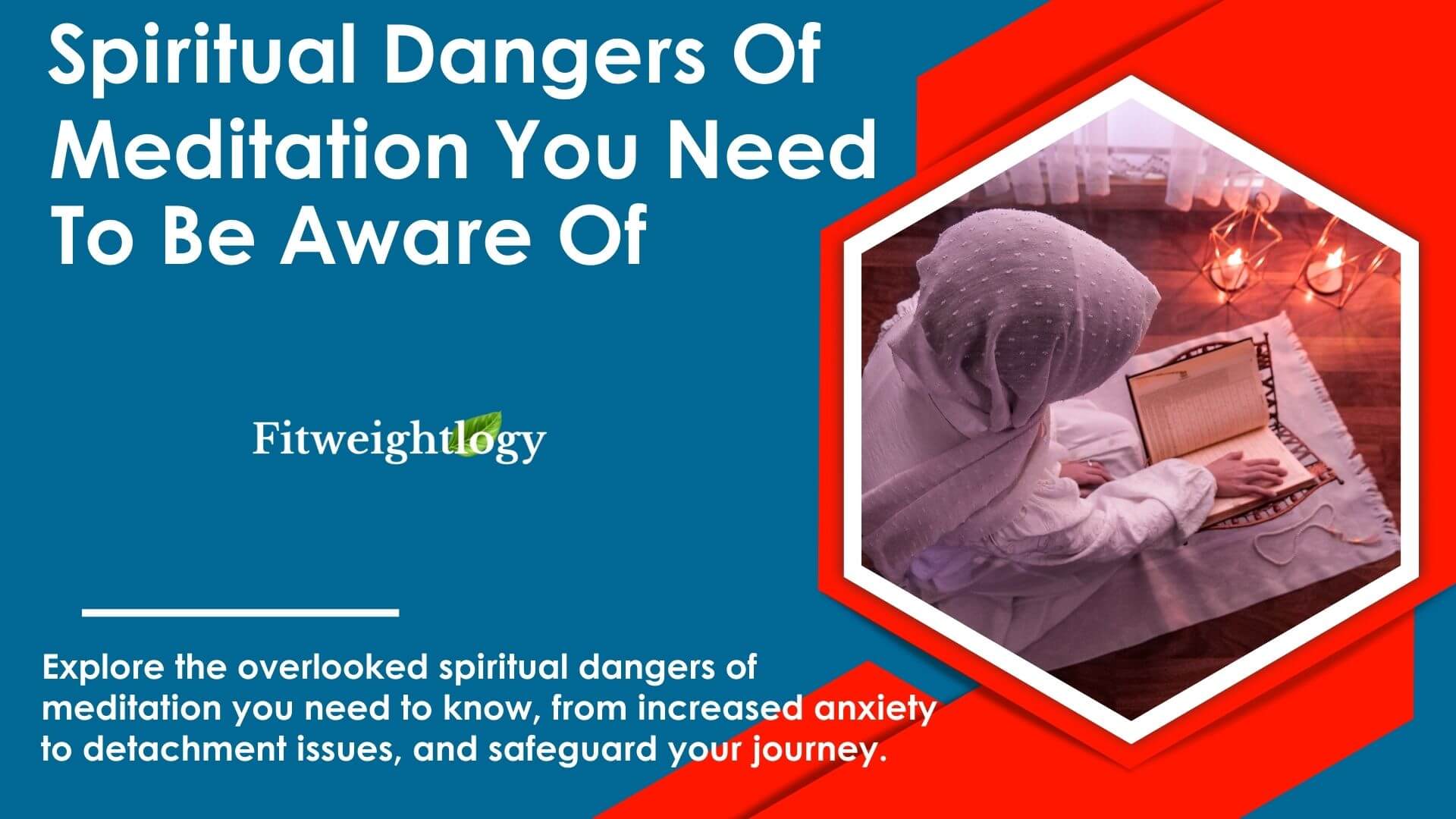Spiritual Dangers Of Meditation You Need To Be Aware Of – Hidden Dangers
Meditation, especially forms like Zen meditation, is often seen as a peaceful and beneficial practice. It promotes relaxation and self-awareness. But, it’s essential to know about the spiritual dangers of meditation that can exist with its benefits. Even though meditation has many positive effects on our well-being, there are hidden dangers. Practitioners should understand these and take precautions.
Approaching meditation without caution or proper guidance can lead to negative effects. These effects can harm one’s spirituality and mental health. It’s vital to know these risks. Making informed decisions when practicing meditation is important.
This article will explore the hidden dangers of meditation. We will look at the potential negative impacts on an individual’s spiritual journey.
Key Takeaways:
- Meditation entails both benefits and risks, highlighting the need for awareness.
- Spiritual dangers include mental illness, negative thinking, unprepared awakening, extreme detachment, and demotivation.
- Guidance from experienced mentors, avoiding solitary practice, incorporating yoga and exercise, and emphasizing breathing techniques are advised.
- Striking a balance between risks and benefits is essential for a fulfilling meditation practice.
- Consulting trusted experts safeguards against potential harm on the spiritual journey.
15 Spiritual Dangers Of Meditation

Meditation is often seen as a way to find inner peace and clarity. But it’s important to know that it can have risks. Even though meditation helps many, it’s vital to be careful. Let’s look at 15 spiritual risks of meditation to keep in mind:
1. Mental Illness
Meditation, sans proper guidance, can worsen mental health, potentially triggering anxiety or depression. Deep introspection may unearth suppressed traumas, intensifying stress and instability. Caution is crucial, especially for those with mental illness histories.
Seek professional guidance to safeguard emotional well-being on your spiritual journey. Prioritize self-care and mindfulness to protect mental health. Let experienced mentors navigate meditation practices, mitigating risks and fostering a safe experience.
Recognize the importance of balanced introspection, balancing benefits with potential pitfalls. Embrace the transformative power of meditation while remaining vigilant against its spiritual dangers. Consult trusted experts to ensure a fulfilling and enriching meditation practice, preserving mental well-being along the way.
2. Negative Thinking
Meditation sometimes intensifies negative thinking, contrary to popular belief, reinforcing pessimistic thought patterns without proper guidance. Regular practice may unearth suppressed emotions, triggering depression as individuals confront difficult feelings.
Furthermore, it can foster detachment, leading to a negative outlook on reality. While detachment has its merits, it can skew perceptions negatively. Awareness of these potential side effects is vital when meditating, necessitating a compassionate approach. Seek guidance from experienced mentors to navigate these challenges, fostering a balanced perspective.
Acknowledge and address negative thoughts with understanding and mindfulness. Prioritize emotional well-being on your meditation journey, embracing its transformative potential while remaining vigilant against the meditation is dangerous. Consulting experts ensures a fulfilling and enriching meditation practice, safeguarding against negative effects.
3. Spiritual Awakening Without Being Ready For It
Unprepared for meditation, sudden Spiritual awakening is often pursued through various forms of meditation, including Buddhist and transcendental meditation.s can destabilize individuals, overwhelming them with profound shifts in consciousness.
Lack of guidance may hinder integration of insights, causing disorientation and confusion. This unpreparedness is a key danger of meditation, akin to opening a door to the unknown without tools to navigate it.
Like discovering hidden clutter in a lit room, the experience may induce feelings of fear and loss. Preparation is paramount on the path to enlightenment, ensuring readiness to confront the depths of one’s being with resilience and understanding.
4. Extreme Non-Attachment
Excessive non-attachment, a spiritual danger of meditation, can lead to detachment from relationships and life experiences. While non-attachment fosters freedom, taking it to extremes results in emotional numbness and disengagement.
Disconnecting from responsibilities and emotions impedes deep connections and emotional growth. Striking a balance between detachment from material possessions and engagement with the world is essential for overall well-being.
Recognize the value of non-attachment without sacrificing meaningful connections. Seek guidance from mentors to navigate this delicate balance, fostering a fulfilling and enriching meditation practice.
5. Unintentional Demotivation
Meditation, though believed to enhance motivation, can paradoxically induce excessive contentment, hindering growth. Some may experience dwindling drive and apathy, mistaking meditation as transcending desires rather than engaging constructively.
Unintentional demotivation, a spiritual peril of meditation, may emerge alongside stress reduction and focus enhancement. Negative thoughts during meditation can dampen enthusiasm, leading to demotivation and lack of energy.
Awareness of this possibility is crucial, prompting proactive measures to counter resulting demotivation. Seek guidance to navigate these challenges, ensuring meditation cultivates motivation while fostering personal growth and achievement.
6. Kundalini Awakening
Kundalini awakening, often linked to meditation, can bring intense physical and psychological changes. Without guidance, it may cause disorientation and instability. This profound energy shift touches mind, soul, and heart, potentially leading to imbalance or discomfort.
Practices like Kundalini yoga and meditation can initiate this process, reducing stress. However, improper awakening may induce fear or unusual energy sensations. Every sensation, whether physical or emotional, relates to Kundalini.
Seek guidance to navigate this transformative experience, ensuring a safe and enriching journey. Embrace the potential of Kundalini awakening while respecting its power and intricacies for holistic growth and well-being.
7. Distorted Psychology and Self-Perception
Deep meditation can reshape one’s perception of self and reality, potentially impacting mental health. It may distort self-identity and understanding of psychological functioning, detaching individuals from emotions and authentic connections.
During meditation, suppressed emotions and memories may surface, altering perceptions of self and surroundings. While these experiences are natural, they can trigger negative thoughts or mental health concerns.
Approach intensive meditation with caution and seek proper guidance to mitigate risks including negative side effects. Prioritize mindfulness of well-being to foster a positive and secure meditation journey. Expert guidance ensures safe exploration of meditation’s transformative potential while safeguarding mental health.

8. Pressure to be Perfect
Meditating for spiritual perfection can create unattainable standards, fostering feelings of inadequacy. The pressure to achieve enlightenment may trigger frustration and self-criticism, undermining the purpose of intensive meditation. Many feel compelled to reach profound experiences through meditative practices like vipassana, yet this pressure leads to disappointment when expectations aren’t met.
Remember, meditation isn’t about perfection; it’s about present-moment acceptance. Excessive pressure hampers progress and enjoyment. Embrace each moment without judgment or expectation, allowing benefits to unfold naturally.
Avoid the trap of striving for unreachable goals; instead, cultivate self-compassion and patience. Seek guidance to navigate meditation’s complexities at a retreat, ensuring a fulfilling and enriching practice. Let go of perfectionism, embracing the journey towards spiritual growth with openness and authenticity.
9. Unmet Expectations
High expectations in meditation can result in disappointment, leading to a desire to quit. Known as “spiritual materialism,” this desire for special experiences can cause sadness if unmet.
Life’s busyness may also hinder meditation consistency. Manage expectations, understanding that meditation’s benefits unfold gradually. Embrace the practice with patience and acceptance, avoiding the pitfalls of unrealistic goals. Seek guidance to navigate challenges, ensuring a sustainable and rewarding meditation journey.
10. Replacement of Therapy
Meditation is not a substitute for therapy; it should complement professional treatment, not replace it. While meditation offers benefits for mental well-being, it may not adequately address deep psychological issues or trauma.
Seeking therapy provides a safe environment to address underlying concerns with trained guidance. Relying solely on meditation for complex issues can impede progress and potentially harm healing.
Remember, therapy offers tailored support for psychiatric problems or unresolved traumas. Embrace meditation as a supplement to therapy, acknowledging its role in holistic healing while prioritizing professional intervention for deep-seated issues.
11. Feelings of Ennui, Emptiness, and Fear
Extended meditation sessions may induce feelings of boredom, emptiness, and existential fear, prompting individuals to question life’s meaning. Without proper guidance, these emotions can lead to profound psychological distress and existential nihilism. As individuals delve into their minds during meditation, they may encounter moments of boredom or emptiness, which can initially be disconcerting.
However, it’s essential to acknowledge that these feelings are natural and part of the meditation process. Sitting in stillness may bring vulnerability, leading to fear as unresolved issues or suppressed emotions surface. Approach these experiences with compassion and understanding, viewing them as opportunities for growth and self-discovery.
With continued practice and gentle exploration, resilience is cultivated, enabling individuals to navigate the highs and lows of meditation. Embracing the full spectrum of emotions encountered during meditation fosters deep healing and transformation on the spiritual journey.
It’s important to recognize that experiencing various sensations during meditation, both positive and negative, contributes to overall growth and well-being. Seek guidance to navigate these experiences effectively, ensuring a fulfilling and enriching meditation practice.

12. Masking Material Injustices
Focusing solely on spiritual growth can overshadow real-world issues and societal injustices. While meditation promotes inner peace, it may foster apathy towards material injustices. Recognize this potential danger of meditation, balancing personal growth with societal awareness.
True spiritual evolution entails addressing systemic problems and advocating for positive change. By deepening our understanding of truth and interconnectedness through meditation techniques, we cultivate compassion and contribute to a more equitable society.
As you meditate, remain grounded in reality and committed to social action. Embrace meditation’s transformative power while actively working towards a better world. Stay mindful of the broader context, integrating personal growth with societal responsibility for holistic well-being and societal progress.
13. Negative Thoughts and Distortions
Meditation, without proper guidance, may amplify negative thoughts and distort reality, a manifestation of the potential negative side effects. Particularly in individuals prone to rumination and self-criticism, meditation can intensify negative thought patterns, compromising mental well-being. Guided meditation can aid in managing negative thoughts effectively.
Quieting the mind during meditation may unearth deep-seated anxieties and insecurities, leading to distorted perceptions. Recognizing these distortions as natural occurrences allows for non-judgmental acknowledgment and redirection of focus to the present moment. Over time, regular meditation cultivates a more balanced and positive mindset.
Embrace meditation as a tool for self-awareness and mental resilience, utilizing guided practices to navigate negative thought patterns, often guided by Buddhist principles. By acknowledging and redirecting negative thoughts, individuals harness meditation’s transformative potential for greater mental clarity and well-being.
14. Resurfacing Suppressed Emotions
Meditation can unearth suppressed emotions and unresolved traumas, causing emotional turmoil without proper guidance. Regular practice creates space for buried feelings to surface, challenging yet beneficial for spiritual growth. Confronting these emotions is vital for self-discovery and healing.
Seeking support from a therapist or meditation teacher offers compassionate guidance through this process. Acknowledge the naturalness of this journey and embrace it as a step towards inner peace.
Meditation’s ability to bring hidden feelings to light underscores the importance of approaching the practice with mindfulness and support. With guidance, individuals navigate emotional upheaval, fostering healing and personal growth on their spiritual journey.

15. Antisocial Behavior
Excessive meditation, emphasizing detachment, can foster antisocial behavior and isolation, detracting from social responsibilities. Effects vary per individual and meditation style. Seeking guidance from experienced teachers mitigates risks, enhancing meditation’s safety and efficacy.
Antisocial behavior, a potential risk of Eastern meditation, manifests as disconnection from social interactions and self-centered focus. Detachment during meditation may induce indifference toward others. Maintaining healthy social connections amidst meditation practice is crucial.
Awareness of these risks prompts proactive measures to uphold ethical obligations and balanced spiritual development. Remember, moderation and guidance ensure meditation enriches rather than isolates, emphasizing the importance of integrating spiritual growth with social engagement for holistic well-being.
Is Meditation Harmful?
People often wonder if meditation can be harmful. There’s a lot of debate and confusion about its negative effects. It’s crucial to look at both the good and bad sides of meditation.
Meditation is mostly safe and helpful when done right, guided by experts. It boosts physical, mental, and spiritual health, which is rooted in ancient Indian spiritual practices. Benefits of regular meditation include less stress, better focus, and increased self-awareness.
But, meditation might not be for everyone. In some cases, it could have negative effects. Being cautious and informed about its risks is important.
Meditation, when practiced correctly and under guidance, is generally considered safe and beneficial for most people.
Meditation might make some mental health issues worse. Although it helps many, it’s not perfect for all. People with mental health conditions should talk to a doctor first before embarking on intensive meditation or exploring
Sometimes, meditation brings up negative thoughts or feelings. This can uncover old traumas or emotions. Yet, facing these can help in healing, in a supportive setting.
Unexpected spiritual experiences can confuse or disorient some people. It’s key to have proper support during spiritual growth. This ensures a balanced journey.
Not everyone feels meditation’s negative effects. For many, it’s a key tool for growth and enlightenment. The goal is mindful practice and dealing with issues as they come.
Being aware of meditation’s possible negative effects helps. With the right precautions, you can enjoy its many benefits safely.
How to Stay Safe During Meditation

Meditation can greatly improve your mind, emotions, and spirit. But, it’s important to practice it safely. Here are some tips to keep your meditation practice safe and positive:
Meditate with the guidance of a teacher or use guided meditation
For a secure meditation practice, seek guidance from a teacher or opt for guided sessions. Learning from an expert ensures correct posture and understanding of techniques. Guided meditations, available in audio or video formats, provide structured practice, preventing potential dangers of unsupervised practice.
Guidance from a teacher offers valuable insights and error correction, enhancing your meditation experience. Meanwhile, guided sessions offer step-by-step instructions, fostering proper technique execution. Prioritize safety to maximize your meditation journey’s enrichment and effectiveness.
Whether with a teacher or guided recordings, remember to seek assistance to ensure a fruitful meditation experience. Utilizing expert guidance or guided sessions enhances safety and enriches overall meditation practice, leading to profound spiritual growth and well-being.
Avoid meditating alone
For safety and support, avoid solo meditation sessions. Meditating in a group or with a teacher, especially during meditation retreats, provides guidance and accountability, which is especially beneficial for beginners. Practicing alongside others fosters a sense of community, offering opportunities to learn and receive advice.
Guidance from a trusted teacher or leader enhances safety by addressing challenges and providing valuable insights. Group meditation settings promote accountability and deepen understanding, facilitating spiritual growth.
Seek out group settings or qualified teachers to accompany you on your journey of enlightenment and self-discovery. Prioritizing group meditation ensures a secure and enriching experience, safeguarding against potential risks and maximizing the benefits of your practice.
Incorporate yoga and exercise
Integrating yoga and exercise into your regular meditation routine amplifies its benefits. Yoga enhances muscle strength, balance, and overall fitness, while also teaching proper breathing techniques for relaxation. By incorporating various yoga poses, you cultivate concentration and presence.
Regular practice fosters mental clarity, calmness, and reduces anxiety, promoting overall well-being. Exercise complements meditation, promoting mindfulness and body awareness through forms of meditation such as Zen or transcendental meditation.
Incorporating physical activity into your meditation regimen offers a holistic approach to self-care, relieving tension, improving blood flow, and easing sitting discomfort. Don’t overlook the importance of incorporating yoga or workouts into your daily routine for enhanced meditation outcomes and overall health optimization.
Focus on breathing
Centering your meditation on your breath, a practice essential in Zen meditation, is crucial for staying grounded and serene. This mindful practice fosters present-moment awareness and soothes the mind. Deep, intentional breaths serve as a powerful tool to alleviate stress and enhance relaxation during meditation sessions.
Mindful breathing yields numerous health benefits, including stress reduction, improved sleep quality, and heightened overall well-being. Embracing paced breathing, characterized by slow and deep breaths, cultivates feelings of calmness and satisfaction.
Conversely, rapid breathing may induce anxiety and overwhelm. By directing your attention to your breath, you unlock a natural reservoir of inner peace and tranquility. Incorporating focused breathing into your meditation routine empowers you to harness a sense of calm and balance within yourself, enriching your meditation experience and promoting holistic wellness.

Learn more about spiritual meditation practice
Enhance your spiritual meditation practice by delving deeper into its methods and traditions. Utilize resources such as books, online courses, or workshops to broaden your knowledge. Understanding the intricacies of spiritual meditation enables you to make informed decisions and ensure safe practice.
Select reputable sources that resonate with your beliefs and values. Consider seeking guidance from experienced teachers or mentors who can offer personalized support and insights into various techniques.
Approach your practice with openness and patience as you embark on this journey of self-discovery and spiritual growth. Continuously expand your understanding to enrich your meditation experience and foster profound inner transformation.
Avoid putting too much pressure on yourself
In your meditation journey, avoid placing undue pressure on yourself. Progress varies for each individual, so be kind and supportive as you evolve in your practice. Strive for a nurturing environment rather than perfectionism, fostering a sense of calm and encouragement.
Follow these guidelines for a safer and more fulfilling meditation experience: maintain an open mindset, seek appropriate guidance, and prioritize self-care throughout your journey.
Excessive pressure during meditation can impede progress and hinder peace of mind. Rather than fixating on specific outcomes, approach meditation with acceptance and mindfulness. Embrace the journey without attachment to results, allowing yourself to simply observe thoughts without judgment.
Remember, meditation is about the process, not reaching a destination. By releasing pressure and enjoying the journey, you can cultivate a more enriching practice and reduce stress in your daily life.
Conclusion: Spiritual Dangers Of Meditation You Need To Know
In conclusion, meditation has its pros and cons. It’s important to be careful while meditating. Despite its many health benefits, there are risks we need to know about. Knowing these risks and how to handle them makes meditation safer and more rewarding.
We talked about risks like mental health issues, negative thoughts, and spiritual awakenings that come too soon. We also discussed the dangers of detaching too much, losing motivation unintentionally, and seeing ourselves in a distorted way.
Meditation isn’t a replacement for therapy. It shouldn’t be seen as a fix for mental health problems. But, if done correctly with guidance, it can aid in growth and self-discovery. Adding yoga, focusing on breathing, and not pushing too hard can make meditating safer.
To get the most out of meditation and avoid risks, get informed and look for guidance. Remember, this spiritual journey is yours to take at your pace. Always put your well-being first. If you’re worried about meditation’s risks or what you’re experiencing, talk to a knowledgeable teacher or mentor.
So, embrace meditation’s benefits but be aware of its spiritual risks. With careful practice and the right help, you can safely explore this deep spiritual practice.

FAQs On Spirituality Dangers Of Meditation
Are you curious about the spiritual dangers of meditation? We’ll answer some common questions to help you understand better.
1. Is meditation a Sin?
Meditation isn’t usually seen as a sin in most spiritual paths. But, certain meditation types might conflict with some religious beliefs. It’s key to know your faith’s teachings and talk to a spiritual advisor if unsure.
2. What are some dangers of meditation?
Meditation has its benefits, but there are risks too. Dangerous aspects include mental illness, negative thought patterns, sudden spiritual awakening, extreme detachment, and poor self-view. It’s vital to meditate carefully and get the right guidance to avoid these risks.
3. Can yoga teachers help me avoid the dangers of meditation?
Indeed, skilled yoga instructors can assist. They offer advice on meditation’s risks and safe practices. Always choose experienced teachers for helpful guidance in your meditation practice.
4. Is there a danger to my thought life when I start meditating?
Meditation can make you more aware of your thoughts, sometimes causing discomfort. Negative thoughts may come up, but that’s normal. With ongoing practice and guidance, you can navigate and overcome these moments.
5. How common are negative experiences during meditation?
Negative meditation experiences differ among people. While some might face discomfort or tough emotions, many have positive, uplifting sessions. Proper guidance and care ensure mostly good experiences.
6. Does dark night refer to the dangerous effects of meditation?
“Dark night of the soul” isn’t about meditation’s dangers. It’s a term for intense emotional and spiritual growth phases. Though tough, the “dark night” is considered a critical spiritual journey part, unrelated to meditation’s risks.
7. Are there any false highs reported by regular mediators?
Some meditators report false highs, or “spiritual bypassing.” This happens when people use spiritual practices like meditation to dodge personal issues, ignoring the potential dangers associated with meditation. True meditation calls for honesty and self-insight for a real spiritual journey.
8. Are there any negative effects of meditation?
Meditation mostly benefits, yet some might face negative side effects without right guidance. Negative impacts include heightened anxiety, stronger emotions, or worsened mental health conditions. Reduce these risks by seeking advice and practicing care.
9. What could go wrong in meditation?
If not careful, issues may arise in meditation. Problems include unready spiritual awakenings, neglecting personal limits, inappropriate attachment or detachment, and substituting for professional therapy. A balanced, mindful attitude is key to a safe meditation practice.
10. Who should not meditate?
Most find meditation helpful, but it’s not for everyone. Those with specific mental health issues, severe trauma, or unstable emotions should talk to a doctor before meditating. Always put your well-being first and make informed choices.
Posted in
Welcome to Fitweightlogy! We are an optimum review website of all the best products associated with weight loss, healthy life, fitness, tips, and motivations. We are a quickly developing organisation given that we typically put our visitors first. A customer-focused experience has regularly been our objective, and we value our comprehensive policies, which have placed us in a domain well beyond our competitors. On this website, we assist our visitors in reaching their desired weight, appearance goals and live a healthy lifestyle, as well as save money and time by meticulously researching and evaluating the market, assessing the available products, and producing informative recommendations based on factors such as quality, availability, price and more. Furthermore, our passion is to assist you in choosing the best possible product through our product reviews.








